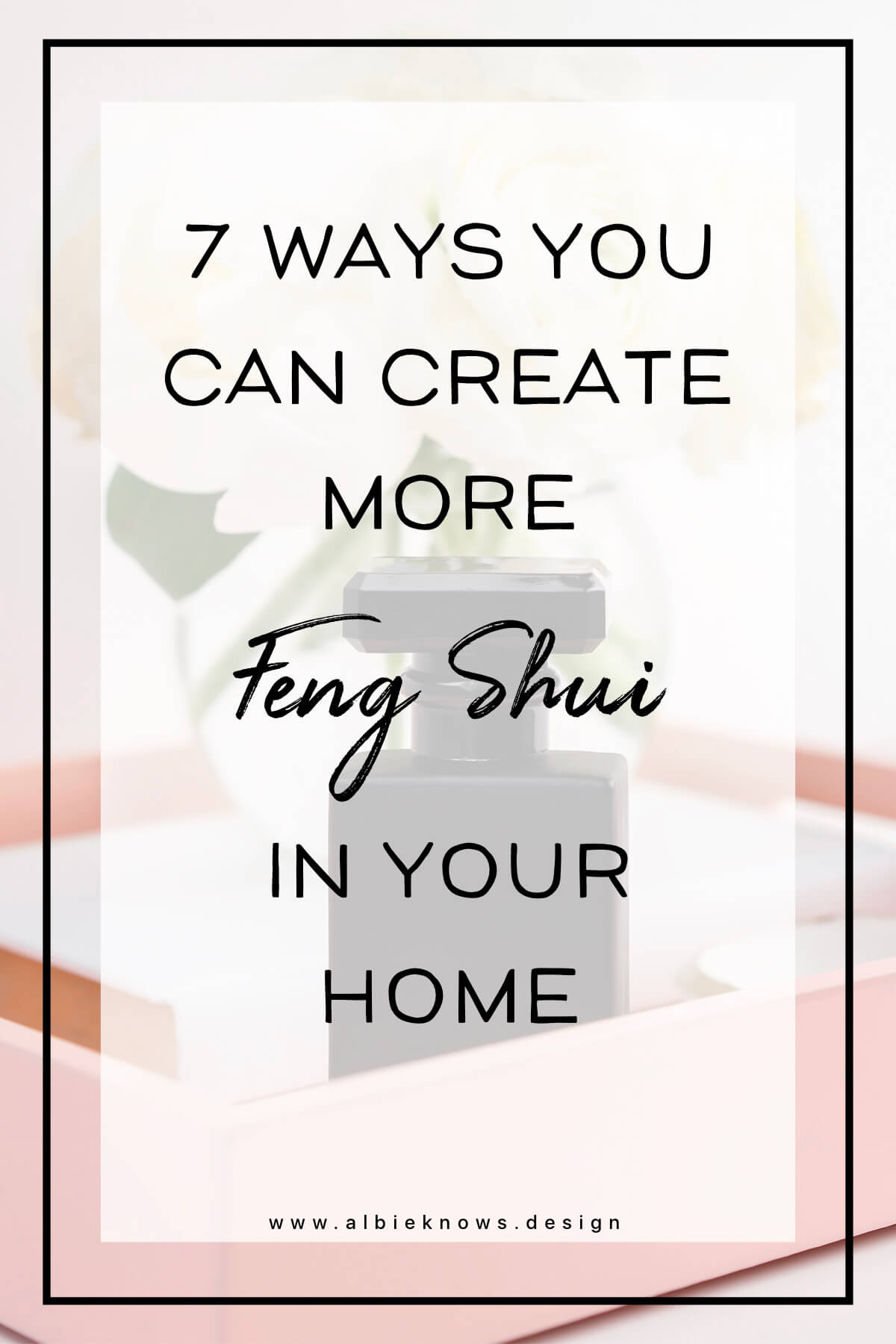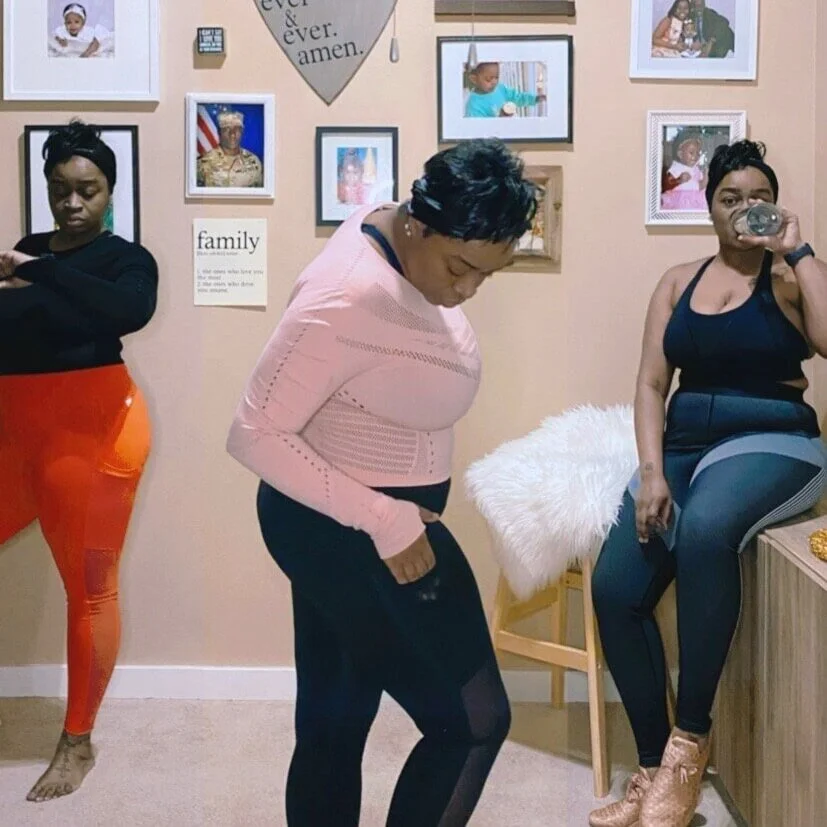Achieving Simple Feng Shui For Happy Living
ORIGINAL POST DATE: 07-05-2018
It's no secret that I am a HUGE fan of Hygge living, primarily being attracting to the the idea of creating more happiness & calm in my lifestyle. With that said, Hygge isn't the only way I try to achieve this.
Enter Feng Shui, and its principles.
The words "Feng" and "Shui" have very simple meanings -- "wind" and "water" -- that represent the presence of balance & harmony. The overarching principle behind the art of Feng Shui is about creating harmony in your everyday life through the flow of energy. This is why so often, although sometimes misused, we'll hear people talk about Feng Shui when referring to their furniture layout -- how is the energy moving throughout this space?
That flow of energy is your "chi" and at the center of really establishing good Feng Shui and ultimately setting the tone for your space.
“A well-designed room can not only improve your chi but your life.”
I am a huge proponent of the idea that your space & emotions are intrinsically linked, so when I first stumbled upon the concept of Feng Shui, I was all in (including taking a certificate course so that I could be extra official about my Feng Shui-ing and all that).
What really drew me in was the notion of how elements of design -- color, materials, furniture placement, etc. -- all affect your mood & health.
Yes... HEALTH!
For example, a person’s health can suffer significantly if they don’t receive enough of the vitamins provided by natural light; so when designing a space, making sure to take full advantage of access to natural light is always top of mind.
Feng Shui isn't a science or something that you have to "believe in" -- the space you're in definitely affects your livelihood -- more than it is a philosophy or a way of living; and at the root of this is your intuition -- it has to feel as good as it looks, otherwise, your efforts are moot.
Although there are different "schools" of Feng Shui, at their core the principles are the same; and applying the principles of Feng Shui in your home is something that you can achieve in your home, with a few conscious changes.
Finding & Creating Balance
In order for Feng Shui to work, it must be personalized & adapted to your mind and life, focusing on the "cures" that mean the most to you -- no singular cure will create a balance in every house.
“Balance is an essential part of life and when one part of your life is thrown off center the rest of it can soon follow suit.”
We hear so many things when it comes to having balance in our spaces, that sometimes it seems more complicated than it really is.
Make sure your space has the appropriate amount of light in the darkness -- not so much light that it's detrimental to your eyes & focus but, but not so dark that you feel tired or lazy. In practice this may translate into dimmable lights or layering lamps.
Another aspect of balance is having a combination of objects that are light & heavy for a sense of stability, while still encouraging motion. Lastly, bringing in elements of nature can really help you take stock of the beauty that is out in the world & keep you grounded in your space.
The best way to determine if there is some imbalance is to look at common problems you're experiencing, that can be symptomatic of an elemental imbalance:
lethargy & depression can mean too much water or too little fire in the space
instability & hyperactivity can be a result of too little earth in the room
impulsiveness, anxiety, and anger may suggest too much fire
an unhappy relationship, excessive boredom, and/or being incredibly serious, could be indicative of having too little earth
exhaustion, begin disorganized, and difficulty thinking clearly can mean too much metal
This isn't a science and there are no right & wrong answers for everyone; instead, you have to be conscious of what you're experiencing in your space to really assess any necessary changes that need to be made.
Placing Objects & Furniture
In Feng Shui, categories of objects represent "cures" or adjustments in the space to activate or enhance energy -- crystals, lights, and mirrors are just some of the basic categories of cures to consider when designing.
Finding what you need is just as important as finding the right place to put it.
Choose your cures based on your life AND space priorities, then place them with intention, really taking into account what you hope to achieve, using a Bagua Map as your guide.
I remember the first time I tried to understand the Bagua Map, I had to have turned it around a solid half a dozen times trying to figure out its head from its bottom. Let me save you the trouble...
Each "section" represents a priority for your life & space. As you ask yourself questions related to these priorities, the ones with the most "no" answers are the ones you should focus your attention on & prioritize, in terms of cures.
So let's say you realize the priority for your cures needs to be prosperity and relationships. For prosperity, you want to focus on your purples & golds, and items that represent (for you) abundance & gratitude; while for relationships, you'd want to focus on pink tones, things that come in pairs, and things that represent intimacy.
Once you've determined all of this, the Bagua Map helps you with the WHERE.
You would lay it over a floor plan (or sketch outline) of your home, aligning the entry area with the bottom (northeast, north, or northwest, depending on your layout). You can also use the map for an individual room, but for right now, we're just going to use an entire apartment layout.
Since we know our focus areas are going to be prosperity and relationships, essentially that would mean focusing on bedrooms, since those are the rooms in this floor plan that land in those areas.
Easy!
Removing Clutter & Chaos
This is a BIG one because in Feng Shui, clutter is associated with chaos; so along this same vein, it makes sense that having a ton of stuff can get in the way of us feeling balanced & at peace in our space.
I can't count how many times I've had people think they need a re-design, when it fact all they needed was to get rid of stuff!
It can be so easy to buy something because it's cute or on sale, however, what you want to do is think about what you have & why you have it. This sentiment was a big driving force behind my decision to make Decor Discovery a bi monthly subscription box, versus monthly -- before you decide to add something new, you need to think about what you already have, what they represent, and why you keep them.
This thought process helps you prioritize positive items & keep out potential negative (energy) items.
Clutter also represents being indecisive and/or unable to move forward -- just think about all the things we hold on to from our past!
Some other things to think about when it comes to dealing with clutter, is where in the home we're inviting that clutter. Keeping your greeting areas clutter free can set you up for a more peaceful experience throughout the rest of the space. For some people, this is easier said than done, because your entryway, for example, is where everyone dumps their stuff at the end of the day. With clients, I like to explore ways of designing the room so we can easily organize & keep the clutter in check.
“The average human spends 30% of their life in their bedroom.”
Other key areas to keep clutter free in the home are the bathroom, family room, kitchen, and bedroom. You want these spaces to promote growth, togetherness and productivity, not stress; especially the bedroom.
This means removing any visual clutter, cleaning out your closet, tossing broken objects and/or anything you just don't use, and deep cleaning with natural cleaners. Things you don't use, that just sit there, are basically dead.
Translation: negative energy.
You want more of the things you use frequently and the things that make you feel good when you look at them. Everything else -- TOSS IT.
Considering the Energy Between Doors & Windows
Unless you're building (or renovating) a home, you don't have any control over the placement of your doors & windows, or over how they look. But there are things you can do to promote an ideal flow of energy.
You want to keep the main door entry way clear and clutter free, being mindful not to OVER decorate it & impede the flow of chi into the rest of the space; organize your entry way, where possible, based on its alignment on the Bagua map, using appropriate elements & colors.
Another thing you can do is avoid placing mirrors opposite your main door, to avoid the back & forth rush of energy (similarly, if you possible, you wouldn't want a window directly across from a door).
Having window coverings is one of the simplest things you can do, because it allows you to control the flow of light & energy, and provides a layer of security from the darkness of the night.
Actually Living in Living Areas
Your living room, ideally, is an area where you want a constant flow of chi; so you never want to block natural pathways in and out of the room.
Anchoring your furniture to a wall, although not always possible (or aesthetically preferred) encourages stability and structure. Decorative accents, lighting, and personal touches are also important in this part of the home, so you want to keep this in mind when choosing your cures.
A huge mistake people make is they design their living room as though it is some sort of museum, versus some place that's meant to be lived in. Last thing you want is to carry feelings of guilt & anxiety because everything in the living room is precious and perfect.
It's for living, so let it live!
Creating Abundance in Kitchen & Dining Areas
In a world where construction is not an option, there are so many small remedies we can implement in these areas that align with the principles of Feng Shui, many of which come down to our choice of furnishings. You never want to stress yourself out, focusing on the things you can't control.
The best shapes for a dining room table include round and square tables, to make it easier for everyone to see one another & have conversation. Wood tables are preferred, for introducing yin energy, promoting stability, and emitting peacefulness. Glass tables and/or tabletops are not ideal or recommended, however, a great solution is using natural plates and serving ware, like pottery and wood.
While using mirrors is recommended, for the perception of increased abundance & prosperity by way of the reflections, you don't want to hang clocks because they represent the end of abundance; no one wants that in the space for gathering to eat.
“Feng Shui Tip: displaying a bowl of fruit on the table demonstrates abundance and prosperity.”
When it comes to the kitchen, there are optimal positions for the space itself, as well as for its components, such as the stove; but builders are going to do what builders what to do. Here's what you can do:
keep the stove clean and free of clutter and clean the burners regularly; dirty stoves deplete energy and strain finances
use copper pots and pans because they attract and encourage positive chi
introduce potted herbs (or other plants) to boost prosperity
keep the fridge stocked to promote abundance
don’t hang the towels on the door of the oven, as this gives an unsafe impression being so close to "fire"
where the stove & fridge (or sink) are close together (less than 2 feet), place a wooden cutting board in between them to mitigate the fire & water energies
use bright and vibrant colors to represent the health of those who live there and throw in accent colors through décor
Protecting the Bedrooms
This one is always a doozy for people. You certainly want your bedroom to be restful and relatively free of the distractions that might take place within the rest of the house; yet because of people's lifestyles, the idea of "rest" is no longer one uniform idea.
I remember working with a couple where the wife wanted a quiet peaceful place to shut down, while the husband was adamant about having a tv in the room because this is how he must fall asleep.
Good grief.
In case you'e wondering, the solution was a beautifully crafted wall mounted tv cover, so that she wouldn't have to see the tv throughout the day & instead could look at something attractive; and at night, while he would be watching tv -- ear plugs and an eye mask... marriage is about compromise after all.
But back to the business at hand -- creating a place of peace & rest.
As is the general idea throughout the different areas of the house, you want the marquee piece of furniture -- the bed -- to have a sort of command position in the room. This means against a wall that's opposite the door, but not directly across from the door. Sometimes, as is the case with our bedroom, this is unavoidable.
I remember when planning out our bedroom this did not sit well with me AT ALL because this is considered the "death placement" because the energy that surrounds doorways is never settled because it's constantly moving around the house, and you want calm & quiet energy next to your bed.
Talk about being restless! Sheesh!
“Feng Shui Tip: a solid wood headboard will instill stability for those who share the bed”
How we deal with and mitigate the bad energy?
a night table that holds a strong visual presence; adding decor and/or a wide shade lamp also promotes good energy
a solid upholstered headboard for strength & stability
nightstands (or other furniture) on each side of the bed support the bed and keep it grounded
very simple décor to keep the chi in the room positive and give it space to move and relax
not hanging any heavy items overhead or mirrors facing (reflecting) the bed
keeping the tv and computers out of the bedroom
“Feng Shui Tip: metal bed frames & bookshelves can result in headaches”
Whether you’re just moving in or seeing you’re home like it’s for the first time, it’s never too late to implement simple strategies to improve the flow & function…especially if it also means introducing more positivity in your environment.
To what extent to you believe in the principles of Feng Shui? What steps would you take to improve the feel & flow of energy in your space?
PIN FOR GOOD VIBES!























